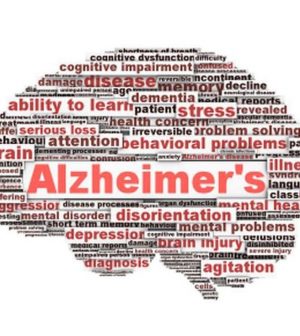- The Best Time of Day to Drink Bone Broth to Maximize Health Benefits
- 8 Ways to Increase Dopamine Naturally
- 7 Best Breads for Maintaining Stable Blood Sugar
- Gelatin vs. Collagen: Which is Best for Skin, Nails, and Joints?
- The Long-Term Effects of Daily Turmeric Supplements on Liver Health
- Could Your Grocery Store Meat Be Causing Recurring UTIs?
- Are You Making This Expensive Thermostat Error This Winter?
- Recognizing the Signs of Hypothyroidism
- 10 Strategies to Overcome Insomnia
- Could Artificial Sweeteners Be Aging the Brain Faster?
There’s Been a Shift in Who’s Funding Alzheimer’s Research

The U.S. government and nonprofits are replacing drug companies as the main drivers of Alzheimer’s disease research, two new studies show.
The findings are from an analysis of national data by Jeffrey Cummings, a research professor at the University of Nevada, Las Vegas School of Integrated Health Sciences.
In one study, his team found that the number of Alzheimer’s clinical trials supported by pharmaceutical companies decreased over the past five years, while trials supported by the federal government and public-private partnerships increased.
Drug companies have reduced early-stage research to focus mainly on late-stage clinical trials, and early-stage research is increasingly being done by academic medical centers, the investigators found.
In the last five years, there’s been a 78% increase in trials by academic medical centers, primarily funded by the U.S. National Institutes of Health (NIH) and programs of the National Institute on Aging (NIA), Alzheimer’s Association, and Alzheimer’s Drug Discovery Foundation (ADDF), including the Alzheimer’s Association’s Part the Cloud initiative.
“Nonprofits and the NIH are making a huge difference in drug development for Alzheimer’s and all other dementias,” Cummings said in an Alzheimer’s Association news release.
The second study found that while drug companies have cut back on Alzheimer’s research, the total number of experimental drugs in Alzheimer’s clinical trials has been relatively steady over the last five years, with a slight increase this year due to additional drugs in phase 2 studies.
The study authors also said there’s an increasing number of drug targets and variety of drugs in the research pipeline, driven by phase 1 and 2 trials.
The studies were published online May 25 in Alzheimer’s & Dementia: Translational Research & Clinical Interventions, a journal of the Alzheimer’s Association.
Maria Carrillo, Alzheimer’s Association chief science officer, said, “Alzheimer’s Association funding, partnerships — including the NIA and ADDF — and advocacy for federal Alzheimer’s research funding are now the primary drivers of growth in Alzheimer’s clinical trials, filling the gap left by pharma’s retreat, and growing and diversifying the front end of the drug pipeline.”
The NIA now distributes more than $3 billion annually for Alzheimer’s and dementia research, up from $500 million just a few years ago.
“This great victory is almost completely due to Alzheimer’s Association legislative efforts, our grassroots advocates, and our champions in Congress,” Carrillo said.
The U.S. Food and Drug Administration has not approved any new Alzheimer’s drugs since 2003, but is reviewing aducanumab (Biogen) for the treatment of Alzheimer’s disease. A decision is expected by June 7.
Cummings noted that “if pharma companies do not see a clear path to FDA approval, they will continue not to invest in Alzheimer’s. This further highlights the importance of the decision before the FDA at this moment.”
Currently, there are four FDA-approved drugs to treat the symptoms of Alzheimer’s dementia, but there are no approved drugs that change the course or delay the progression of the disease.
More information
The U.S. National Institute on Aging has more about Alzheimer’s treatments.
SOURCE: Alzheimer’s Association, news release, May 25, 2021
Source: HealthDay
Copyright © 2026 HealthDay. All rights reserved.










